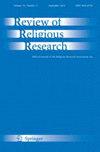Transcendent Accountability and Pro-Community Attitudes: Assessing the Link Between Religion and Community Engagement
IF 1.7
1区 哲学
0 RELIGION
引用次数: 0
Abstract
Prior research has established a positive relationship between religiosity and civic engagement but focused on public religiosity rather than private religiosity without explaining the relationship. We examined private religiosity as well as public religiosity in relation to community engagement, explaining the religiosity-community engagement relationship with two understudied mechanisms: “transcendent accountability” (seeing oneself as accountable to God or a higher power for one's influence on other people or the environment) and pro-community attitudes. For this examination, we applied structural equation modeling to analyze data from a nationally representative survey. We found that survey respondents who believed in a higher power, privately practiced devotional prayer and study of religious texts, and attended religious group activities (other than worship services), were more likely to report transcendent accountability to a higher power for their influence on other people and the environment. We also found that transcendent accountability was related positively to pro-community attitudes, which in turn was positively associated with community engagement. The indirect relationships between religiosity and community engagement were mostly significant. In conclusion, both private and public religious behaviors are consequential in the religiosity-civic engagement relationship, and the religiosity-linked virtue of transcendent accountability and its associated pro-community attitudes contribute to civic engagement.超越问责与亲社区态度:评估宗教与社区参与之间的联系
先前的研究已经建立了宗教信仰与公民参与之间的正相关关系,但侧重于公共宗教信仰而不是私人宗教信仰,没有解释这种关系。我们研究了与社区参与相关的私人宗教信仰和公共宗教信仰,用两种尚未得到充分研究的机制解释了宗教信仰与社区参与的关系:“超越问责制”(认为自己对上帝或更高的权力负责,因为自己对他人或环境的影响)和亲社区态度。在这项研究中,我们应用结构方程模型来分析来自全国代表性调查的数据。我们发现,相信更高权力,私下进行虔诚祈祷和宗教文本研究,并参加宗教团体活动(而不是崇拜服务)的调查受访者更有可能报告他们对其他人和环境的影响对更高权力的超越责任。我们还发现,超越问责与亲社区态度呈正相关,而亲社区态度又与社区参与呈正相关。宗教信仰与社区参与之间的间接关系最为显著。总之,私人和公共宗教行为在宗教-公民参与关系中都是重要的,与宗教相关的超越问责的美德及其相关的亲社区态度有助于公民参与。
本文章由计算机程序翻译,如有差异,请以英文原文为准。
求助全文
约1分钟内获得全文
求助全文
来源期刊

Review of Religious Research
Multiple-
CiteScore
2.50
自引率
20.00%
发文量
31
期刊介绍:
The Review of Religious Research (RRR) publishes empirical social science research on religion, primarily in sociology and social psychology and related fields of psychology, and scholarly literature reviews of research in these fields. RRR provides a forum for research across multiple disciplines and approaches, including research on the following topical areas: Clergy; Church programs; Comparative analyses of religious denominations and institutions; Denominational and congregational growth, decline, and vitality; Denominational and congregational conflict, competition, and cooperation; Ethnicity/race and religion; Generational and personal religious change; New religious movements; Personal spiritual and religious beliefs and practices; Religion and attitudes; Religion and family; Religion and gender, Religion and social behavior; Religion and well-being; and Research methodology. Among the characteristics that distinguish RRR from other academic journals on the study of religion are its applied focus and the opportunities it offers for academics and denomination-based researchers to share their findings with each other. RRR aims to facilitate the sharing and comparing of applied studies between denominational and academic researchers. RRR is the official quarterly journal of the Religious Research Association, Inc. RRR regularly publishes Original Articles, Research Notes, Review Articles, Applied Research Abstracts, and Book Reviews, and occasionally publishes articles on the Context of Religious Research. Applied Research Abstracts: This type of publication (previously called Denominational Research Reports) consists of a 350-550 word summary (without any references) of an applied research study in the form of a structured abstract, with the following section headings: Background, Purpose, Methods, Results, and Conclusions and Implications, followed by 3-4 keywords. The author may included a footnote that states: (a) whether a complete report exists and how it can be obtained; (b) whether the raw data are available in electronic form and how they can be obtained if the authors wish to make them available to other researchers; and (c) whether the authors would like to collaborate with other researchers to further analyze the data and write a full report for possible journal publication as a peer-reviewed manuscript. Such abstracts should be submitted to the journal editor for consideration for publication. Book Reviews: Unsolicited book reviews are not accepted for publication in RRR. If you would like to review a book for the journal, contact the Book Review Editor, David Eagle, Ph.D. – david.eagle@duke.edu Context of Religious Research: This journal heading covers items about awards and announcements, memoriams, and articles about the research process (e.g., articles on research methods and statistics, and profiles of denominational research organizations), as well as invited addresses to the Religious Research Association. Unsolicited articles should be submitted to the journal editor for consideration for publication. Original Articles: These are scholarly and methodologically sophisticated research studies: see Information for Authors on this website and the Submission Guidelines on the Springer RRR website for details (https://www.springer.com/13644) Reseach Notes: These are scholarly and methodologically sophisticated research studies: see Information for Authors on this website and the Submission Guidelines on the Springer RRR website for details (https://www.springer.com/13644) Review Articles: Authors should send an email to the journal’s editor describing the nature and scope of a proposed literature review to see if it is suitable for publication in RRR. See Information for Authors on this website and the Submission Guidelines on the Springer RRR website for details (https://www.springer.com/13644) The journal’s editor is Kevin J. Flannelly, Ph.D. – kjflannelly@gmail.com
 求助内容:
求助内容: 应助结果提醒方式:
应助结果提醒方式:


